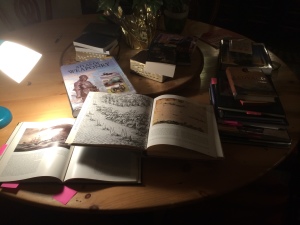A Guest Post by Darke Conteur
I love to write. I love putting words together to form beautiful scenes, or insightful articles on interesting topics. I’m enjoying myself right now as I write out this post, and it’s because of this love that I set certain goals for myself when I started writing full time.
Back then, I had just an inkling of what it was like to be a writer. Sure, I’d written a few stories, nothing published. I thought, if I’m going to do this, I might as well discover all that writing had to offer. That meant exploring as many aspects of writing as possible. Everyone writes novels, but how many write short stories as well? Or flash fiction? What about writing a script? These idea’s tantalized me with possibilities. Whether or not they would prove to be fruitful was anyone’s guess, but I didn’t want to limit myself for anything.
I explored the world of flash fiction and became a content editor for a small online eZine and I wrote, and had published, the only flash piece I ever wrote. I wrote novels, and was on the editorial board for my local newspaper, and yes, I even wrote a couple scripts.
My jaunt into the genres was just as rewarding. Paranormal and scifi short stories were accepted, and my only erotic short story published with the first place I submitted it too (and for money. Sex sells! ;D ). The goals I put before me were falling like flies, and there was only one more attempt I needed to cross off my list to round off my goals; write something in the every-popular category of Young Adult.
Alas, my luck ran out.
It was a time-travel scifi novella involving two teenage boys. The plot was good, but there was something inside me that didn’t spark with this story. I tried again, re-working it into something a little tighter, but again, it fell short of my expectation. Was it the genre? No, I’d written other scifi stories and they were published. Was the story too short? Again, no. I wrote a paranormal novella and that was fine. The only thing I could conclude was that it was the YA category. As I looked over my other stories, I noticed the characters were all adults. Even my WIPs had adult characters. Many of them over the age of thirty. Whatever connected me to my previous stories couldn’t connect me to this story because the characters were too young.
I failed. I couldn’t write Young Adult.
I considered this a disappointment, but it was also a revelation. It showed me that I have limitations. Limitations that allow me to focus on the projects I know I can write. Not every writer can write everything. We all have that one genre or format that we can’t or won’t write. I don’t see that as a failure, I see it as a strength. It means we understand our craft as it pertains to us. We understand our writing style, our voice. In the end, I realized setting up these goals showed me not only where I failed, but where I could create.
Darke Conteur is a writer at the mercy of her Muse. The author of stories in several genres, she prefers to create within the realms of the three ‘S’; Science Fiction, the Supernatural, and Steampunk. A gamer at heart, she also enjoys knitting, gardening, cooking and good music. When not busy writing, she attends to one husband, one wannabe rock star, two cats, and one ghost dog.

